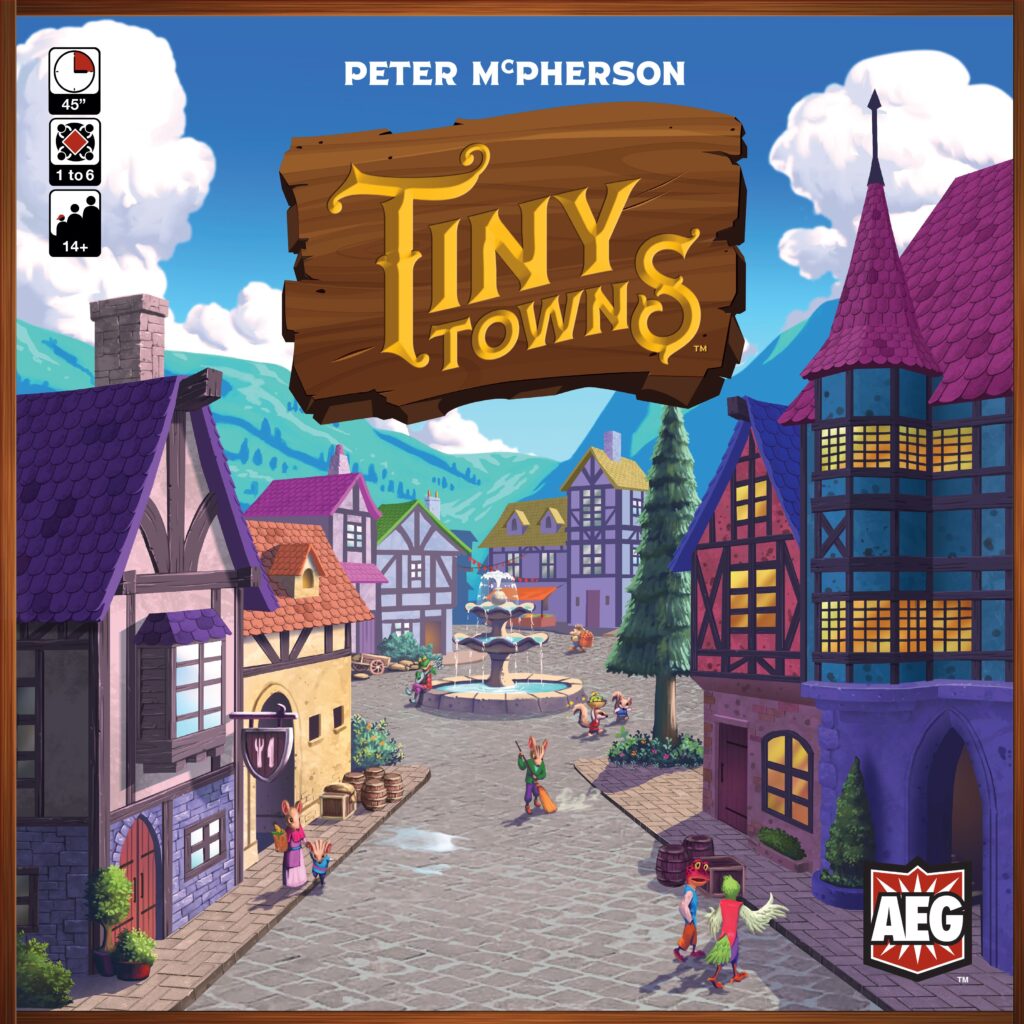How To Play: Tiny Towns – Setup, rule summary and strategy
Become a master architect of 'Tiny Towns' by mastering critical elements such as efficient resource management and strategic placement, recognizing the strategy behind each monument, and adeptly adapting to your opponents' moves. With these guidelines encapsulated in our guide, nail the core tactics and elevate your game. Happy building!

Overview
Ready to master Tiny Towns? Perfect, as I’ll guide you through the game rules with ease and unveil the strategies that worked wonders for me—and can do the same for you. Whether it’s your first build or you’re aiming to outsmart the veterans, this guide will provide the cornerstone you need. Dive in as we dissect the ruleset and explore the best tactics that’ll guide you to victory!
What’s in the box
- 6 Player boards
- 25 Building cards
- 15 Monument cards
- 15 Resource cards
- 126 Wooden buildings
- 1 Wooden master builder hammer
- 90 Wooden resource cubes
- 6 Wooden monuments
- 1 Score pad
- 1 Rulebook
How To Play Tiny Towns: Rules Summary
Setup
Begin your Tiny Towns adventure by preparing the game space. Lay out the board, giving each player a 4×4 grid representing their town. Distribute the individual building cards and pieces to all participants. Decide who will be the Master Builder first.
Gameplay
Master the flow of the game by understanding each turn. The Master Builder selects a resource; everyone picks it up. Players place their resources onto their boards to match buildings’ patterns. Then pass the Master Builder role. Continue this cycle; build your tiny town with attention to both resource management and opponent actions.
Winning
Finding victory in Tiny Towns involves optimizing your town’s layout. Once a player fills up their board or cannot place any more resources, the game ends. Tally your points with precision—buildings generate points; unfilled spaces detract points. The highest score wins.
Special Rules & Conditions
Navigate the unique twists with agility. Monuments have special conditions; learning them boosts your strategy. Players may invoke Cottages to score extra points, providing food from other buildings. Sometimes, certain buildings or resources may become scarce, encouraging you to adjust tactics fluidly. Don’t forget resource scarcity – it might change the gameplay!
Best Tiny Towns Strategies
Mastering Strategic Placement in Tiny Towns
Understanding Resource Patterns
Firstly, recognizing patterns is crucial for efficient resource management. When I played with friends last week, I remembered resource types often repeat in the buildings’ construction. Consequently, prioritize these repeated resources to maximize your town’s space.
Planning Ahead
Secondly, this successful approach requires visualizing future buildings. Imagine, during weekend gameplay, seeing two steps ahead made a placement strategy apparent, resulting in fewer wasted turns and resources.
Flexible Foundation
Finally, despite having a plan, stay adaptable. Often while playing, others’ choices necessitate a shift in your strategy. Therefore, keep an open map area wherein new resource types can be introduced without disrupting your town’s layout.
- Identify common resource types.
- Visualize future constructions.
- Maintain layout flexibility.
Unveiling the Power of Monuments in Tiny Towns
When diving into ‘How To Play Tiny Towns’, understanding the impact of monuments is crucial to crafting your winning edge. Each monument provides a unique advantage, hence selecting which to construct can sway the game in your favor. First, assess your monument’s special ability—it can guide your game strategy from the onset. Next, determine the game phase for its construction, based on surrounding buildings and resources to eliminate waste.
Picking the Perfect Monument
- Compare abilities to your strategy.
- Analyze their synergy with your buildings.
Timing Your Build
- Maximize resource allocation—don’t rush.
- Monitor opponents’ boards to inform timing.
Integrating Monument Benefits
Ensure the monuments harmonize with your town’s layout and objectives, embellishing its strengths or compensating for weaknesses.
The Art of Counterplay: Smart Adaptation in Tiny Towns
Understanding and adapting to your opponents’ moves in Tiny Towns is paramount. Here are some pivotal strategies:
- Monitor their board continuously to predict which resources they’ll gravitate towards
- Cleverly call out resources that least benefit your opponents, disrupting their plans
- If resources become scarce, shift your focus to alternate buildings that suit available supplies
- Plan for resource calls you don’t want, ensuring they won’t derail your town’s progress
- When an opponent’s call benefits you, maximize the opportunity and augment your layout efficiently
Anticipate Opponent’s Resource Needs
Disrupt Resource Flow
Adapt Building Strategies
Expect the Unexpected
Make Opportunistic Moves
Building a Legacy in Tiny Towns
Now that we’ve armed you with strategic insights for managing resources, maximizing your monuments, and adeptly responding to the strategies of your opponents, you’re ready to forge your path to victory in Tiny Towns. Whether you’re building your very first cottage or you’re an experienced architect aiming for complexity with elaborate monuments, the finesse with which you apply these strategies will distinguish you as a master builder. Remember, the best strategy is flexible, thoughtful, and always one step ahead. Gather your friends, build wisely, and let your tiny town blossom into a bustling city!
Want to know what we think of Tiny Towns? Read our detailed review of Tiny Towns here

